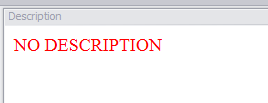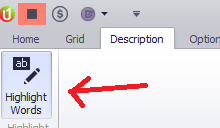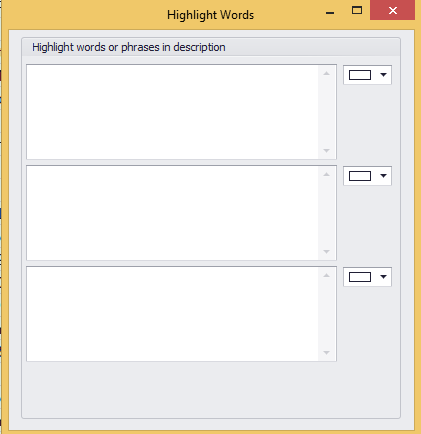In this tutorial, we’ll show you how to customize listing information in the search results grid and how to use local filters.
Skip to Tutorial Section:
- Size Font & Row Height
- Load Item Specifics by Category ID
- Adding Item Specifics to Search Results Field
- Rearranging Item Specific Columns in Results Field
- Removing Fields in Search Results Field
- Saving & Resetting Fields
- Using Filters to Customize Search Results Fields & Rows
- Filters to Remove Listings
- Other Examples of Using Filters
- Filters Best Practices
- Highlight Words & Phrases in Description Panel
Size Font & Row Height
You can customize the results grid to better suit your needs in terms of font, text size and row height to better serve the visibility of new results found by uBuyFirst.
You can do this by navigating from the main menu to GRID > GRID FONT.
Once selected a dialog box will open with font options.
For row height, use the up and down arrows or click and replace the number in the row height number field.
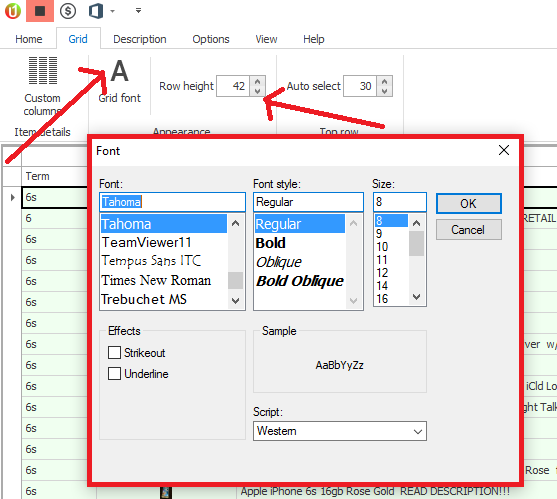
Adding Item Specifics
Adding Item Specifics can help you include critical information about your products that are necessary to making an accurate purchasing decision.
In order to see item specific you’ll want to first indicate which of these fields you’ll want to see. Ex: If I’m searching for phones, I might want to see “CARRIER” and “GB Size” item specifics.
If you don’t wish to see item specifics in the results you can skip this section.
Navigate to GRID> CUSTOM COLUMNS.

- Enter in the eBay category ID number and eBay country site.
- Select item specifics for the provided category.
- Click “CREATE COLUMNS” and fields will be added
- To delete column select the field in the bottom window and click REMOVE.
Adding Fields to Search Results
Right click on any field in the column header on the RESULTS panel.

- Column will show up in this list if it’s not currently present on the search results grid.
Rearrange Field in Search Results Panel
To add the column, click and hold the field and drag it to the top of search results grid where the other columns are present and release the mouse button.

Delete Field
- Right click on any column header in the search results grid then click HIDE THIS COLUMN
- Otherwise delete from GRID > CUSTOM COLUMNS
Save and Reset Fields
- Fields in the RESULTS panel are saved to your workspace. Make sure to save your workspace when finished modifying.
- Go back to stock fields by right clicking any column header field and click “RESET LAYOUT”
Local filter rules assist in identifying and/or excluding new listing records based on your unique criteria. This is useful because the ways in which sellers create and describe listings can widely vary to the point where making initial search criteria impossible to set criteria that might filter out items you might buy. While leaving search parameters too generic might being back too many irrelevant results that obscure and distract from listings that fit your buying criteria. Every buyers specific business needs along with product type vary so there is no set way of implementing filters. In this tutorial we’ll give various examples of when and how to use filter criteria to generate beneficial ideas of where you can apply them to your buying platform.
Using Filters to Customize Search Results
Local filter rules assist in identifying and/or excluding new listing records based on your unique criteria.
This is useful because the ways in which sellers create and describe listings can widely vary to the point where making initial search criteria impossible to set criteria that might filter out items you might buy.
While leaving search parameters too generic might being back too many irrelevant results that obscure and distract from listings that fit your buying criteria.
Every buyers specific business needs along with product type vary so there is no set way of implementing filters.
In this tutorial we’ll give various examples of when and how to use filter criteria to generate beneficial ideas of where you can apply them to your buying platform.
To access the local filters settings, navigate to HOME > FILTERS
Remove Listings
- Best Match – eBay’s best match algorithm does a fairly good job at suggesting relevant items. However, sometimes they may suggest items that aren’t specific to your exact search query. Example: Searching for “iPhone 5” eBay might throw in a small number of results for iPhone 5s to try and up sell the buyer thinking that in some cases, the buyer is simply looking for a A) a phone and B) and iPhone. In other cases, the seller might not have included enough information in the title, description, catalog ID and item specifics where eBay can make an exact match or where the seller has used keyword spamming in the title to drive more traffic to their listing.

In the above example, you would create a filter rule with the ACTION = REMOVE ROWS, make the FILTER ALIAS “5s” and create condition criteria where the listing item specific “MODEL” isn’t an exact match for that specific model I’m looking for. Mainly, because under eBay Buyer Protection, if the incorrect model comes you’re almost always guaranteed the opportunity for a return regardless of the sellers policy for returns and warranty. (There is no returns IF the correct item comes).
Other Examples of Filter Rules
Below image showing rule if eBay item condition field is for parts or not working to highlight the cell RED. Also duplicated this filter rule to highlight green if not for parts.

Below image showing filter rules if the available quantity is greater than 1. Also duplicated this filter rule to show other color if quantity is 1.

Below shows filter rule for returns field to show red if no returns are selected by the seller. Duplicate filter rule created to show green if returns are accepted.

Below filter rule created to show green for best offer field if available by the seller. Duplicate rule created if not allowed.

Below filter rule created if seller has best offer (make an offer) available on the listing. Duplicate filter rule created if not allowed.

Below filter rule created to highlight the TITLE field if the TITLE or DESCRIPTION contains the word “icloud” (A condition aspect of cell phones that renders the value significantly less). We don’t want to REMOVE the field from the search level or filter because a seller could say “This phone isn’t icloud locked” OR “The phone is iCloud locked” OR “iCloud locked status unknown”. The filter rule will at least highlight this field where visual recognition will help us to remember to manually located and identify further information within the listing to know if the item is good to buy.

Below shows the filter rules main navigation.
- Ensure each is selected.
- Uncheck to temporarily disable filter rule

Below shows search results layout with these filter rules applied.

Best Practices
- Use filter rules to help identify purchasing logic that either qualifies, disqualifies or flags for further review.
- Keep it simple to start with. If using REMOVE function, ensure many search results are loaded up and toggle between activating and disabling the filter rule to ensure filter rules aren’t removing listings that are within your purchasing criteria.
- Create rules after allowing many listings to appear and recognizing repetitive purchasing logic that you use.
- Visual (color) recognition allows you to scan listing data faster than reading text only content allowing you to make faster, more accurate purchasing decisions and win more items!
Highlight Words & Phrases in Description Panel
Making best use of the description panel will greatly assist in making fast, accurate and smart purchasing decisions. In this tutorial we’ll explain the basics of highlighting words or phrases.
Description
- The description area will contain the exact item description information from the seller including HTML markup.
- Resize the overall font within the panel by clicking the +/- sign in the lower left corner of the Description panel
Highlight Words or Phrases
Using the Highlight feature will allow you to more quickly scan listing information that can sometimes be a sellers novel. In addition, it can help to quickly identify important keywords or phrases that automatically qualify or disqualify a potential listing where a specific search criteria would be too restrictive and potentially exclude qualified listings.
- Navigate to DESCRIPTION > HIGHLIGHT WORDS
- A dialog box will appear with three sections and a color designation for each set of words or phrases
- Use these as you see best fit. Some users will enter in item specific information as one color and potential defects to highlight with another color.
Example: For cell phones I might want to input all the carriers for a particular model because sometimes the seller might post under the wrong product ID and within the listing indicate the actual carrier within their text description. In addition, I might want to see all keywords or phrases that might devalue or disqualify a listing based on a particular defect that’s commonly described with certain keywords.
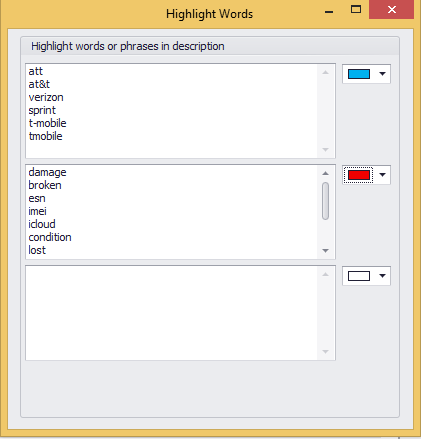
Listing would look like this prior to applying highlighting

And like this after….

As you can see, it’s much easier to scan the listing for these major purchasing criteria and either be able to decide much faster or prevent a bad purchase.
No Description
The words “NO DESCRIPTION” in red will appear when the seller doesn’t include any text or html in the description part of their listing.
